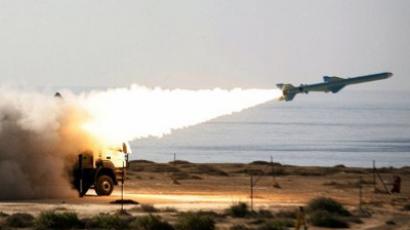‘US not ready to wage war against Iran’
Despite conflicting statements from top Israeli officials on Iran’s nuclear program, the threat of war remains high. US Colonel Douglas Macgregor told RT that after an Israeli strike, Tehran won’t need to build nuclear bombs - it will be given them.
RT: President Obama has put forward an ultimatum for Iran: “either make progress with negotiators or face consequences,” consequences meaning war. Some say a strike may happen within the next few months. In your opinion, how realistic is that? Should we expect a war this summer?Douglas A. Macgregor: Topical question right now in Washington DC. I think the answer right at the moment is “no”. President Obama is not remotely interested in waging war against Iran. So let’s be clear about that. No-one at the top of the United States military establishment is interested in waging war against Iran. And the intelligence community has made it abundantly clear Iran is nowhere near the development of a nuclear warhead or the capacity to deliver one. So if we add those thinsg up, it’s very obvious that at least in the places that count – the White House, the Department of Defense – there is no interest in waging a war on Iran.RT: There is a great push from Israeli interest groups on the Obama administration to back a potential strike. But the administration said Iran hasn’t even decided to build a bomb. So all this war talk is based on what?D.M.: It’s based really on the American Israel Public Affairs Committee and its subordinate affiliated elements. They represent enormous quantities of money, they’ve through many ways cultivated enormous influence and power in the Congress.RT: So the war talk is just to appease the lobbyists?D.M.: I think you’ve got a lot of people on the Hill who fall into two categories. One category that is interested in money and wants to be re-elected. And they don’t want to run the risk of the various lobbyists that are pushing military action against Iran to contribute money to their opponents.RT: Colonel Macgregor, some say the Israeli leadership sees this summer as the window of opportunity that they don’t want to miss for two reasons. One – Iran has very few friends in the region. Syria, it’s closest ally, is a mess right now. And second – presidential elections coming up in the US. Some say Israel is going to lose its leverage over Obama, and it’s going to be very hard for him to say “no”. What do you think about this window of opportunity for Israel?D.M.: If you were to launch a strike in the summer, this would cause a dramatic downturn in the economy. Just consider that we had a rumor that supposedly Iranian commandos had destroyed a pipeline in Saudi Arabia. That’s a fanciful nonsense, and eventually it was denied by Aramco, the Saudi Arabian oil corporation. But in that short period of time oil skyrocketed on the market up behind $115 a barrel. But the point is: just a rumor of action was enough to send oil through the roof. So we had a foretaste there of the dramatic economic consequences for the world if we move ahead and support Israel in its desire to strike Iran. That’s why I don’t think President Obama is remotely interested.RT: So you don’t think that the Israeli leadership sees summer as a window of opportunity?D.M.: Well, they may. But don’t count out the Israeli population. Let’s not assume that everyone in Israel is anxious to see Iran destroyed. I think that’s misleading. There is more division of opinion in Israel than we think. So again, how long can Mr. Netanyahu and Mr. Barack play this game of essentially trying to bully President Obama and push him into action that he would otherwise choose not to take?RT: The administration is basically saying all they need is evidence that Iran has acquired a nuclear weapons capability. This capability issue is very vague. It means being capable of doing something, but not necessarily doing it…D.M.: It’s deliberately vague. It’s deliberately ambiguous so that various people can define it as they like. What is a capability to do something in terms of nuclear weapons development? How much enriched uranium are we talking about? Is it just enriching uranium? Does it involve packaging the enriched uranium? Does it involve a test of some type? No-one is being very specific, and I think that is purposeful. Because if you are sitting in the White House right now, and you are sitting at the CIA, NSA, DIA and the Pentagon, you can always say: “Well, we said ‘capability’, and we don’t see it yet.”RT: So the purpose of this is to keep the Israelis in this vagueness?D.M.: President Obama’s preeminent concern is to get re-elected. And that’s a very dangerous proposition right now for him depending on what the Israelis do. If they launch a strike on their own, without consulting us, independently from us entirely, and they do it, say, late October, shortly before the election, Obama then can say: “We are obligated, we have to help our Israeli friends” – and he looks good. If they do it earlier, then the consequences can be very profound for him, because it would certainly tank our economy. We would be in severe difficulty here in the United States.We have a very neo-Wilsonian interventionist elite inside Washington that operates independently of the American people, that thinks of itself as being morally superior and justified in taking action anywhere against anyone that it deems appropriate. That’s the problem. And Iran is justifiably concerned about that. But they have not reached the point where they can weaponize anything. They don’t have that capability. And we do have the ability to detect that, know it and respond to it. They know those things.What we need is to move beyond this ridiculous confrontational setting that both of us are trapped in. And that’s very hard to do in an election year, when everyone is pandering to various elements of the electorate for money and votes.RT: Colonel, let’s say world powers, the P5+1, negotiate something, but the results don’t satisfy Israel and the US, and they do go to war in summer as some predict. What kind of immediate backlash should they expect?D.M.: Iran’s trump card is subversion. The ability to subvert.RT: So their retaliation would be in the form of terrorism?D.M.: It would be in the form of what I would call asymmetric attacks, in other words high pay-off, low investment. You would use what you can beyond your borders in populations friendly to you to attack the other person’s interests. We shouldn’t underestimate how much damage that could involve. And remember, we know that, for instance, Hezbollah, as well as Iranian elements are here in the United States. So we know that we would sustain losses here at home. There would be damage here in the United States. How many bombs would you have to explode in public malls to do enough damage to awaken everybody to what’s going on?My point is: those are the kinds of things I would expect, but a direct military confrontation would be a losing proposition for them. They might be able to inflict damage on our air forces or our naval forces, but not on a scale that would make any difference to the outcome. They would sustain enormous damage and enormous losses.RT: What about the long-term effect? Some say even if Iranians haven’t decided to build a bomb, they will, if attacked.D.M.: I would say there is something more important. We talk about what they would do if attacked – I think we should look at the rest of the world. What would the rest of the world do, if Israel attacks Iran? Remember – this is an unprovoked assault! The Israelis may claim otherwise and insist otherwise and paint this picture of enormous danger represented to Israel, but the truth is no-one buys that. My view has always been that if you do this, if Israel does this, that Iran will very definitely have nuclear weapons. They won’t have to build them. They’ll get them. People would provide weapons to them. They would have more help than they know what to do with. And Iran would grow more hostile and more bitter and more angry and more dangerous than it has ever been.RT: I want to ask you about Syria. The Obama administration has kind of ruled out a military intervention saying it’s too complicated. What in your opinion keeps the US from attacking Syria?D.M.: There are several things. First of all, there is a quiet recognition behind closed doors, that if Assad is removed – however much people don’t like Assad – that the government that would succeed him would be a radical Islamist Sunni Muslim government. Hostile to Israel, hostile to the West, hostile to Shia Islam. In other words – not a good development from the standpoint of the United States or Europe. I think that is understood.Secondly, there is an understanding that Syria actually has – despite the fact that it’s much smaller than Iran; they have 22 to 23 million people, I think – very good armed forces. It does have an integrated air defense structure that would take some time to dismantle. But its ground forces are actually very good. Of the Arab forces I would describe the Syrian forces as probably among the best, if not the best. Best disciplined, best officered.RT: What would be the main argument that you would suggest for the US not to attack Iran?D.M.: Right now we see Iran through one lens, in one way. We see it as an unchanging theocracy that is very anti-American and anti-Western; incurable, if you will. In other words it is fatally stricken with theocratic disease and religious fanaticism. I don’t. I think it will change. And I think if we can back away from this, Iran would evolve differently over the next ten years. And we don’t have to have this hostile relationship or confrontation.RT: That would be your main argument?D.M.: That’s one of my arguments. Look at the future. Look at what is driving Iran. What is Iran’s principle interest? Internal modernization. Economic development. What do its people want? Israel, the focus for everyone’s hatred in Iran? Absolutely not. Most Iranians couldn’t care less about it. In fact most Iranians are not very friendly towards Arabs. So the bottom line is: why are we doing what we are doing? We are looking at things as if they were never to change. Nixon had the foresight to understand China was at the beginning of a long period of change. My point is that we are going to discover in the next few years that Iran too is at the beginning of a long period of change.RT: Thank you very much.D.M.: Thank you.













